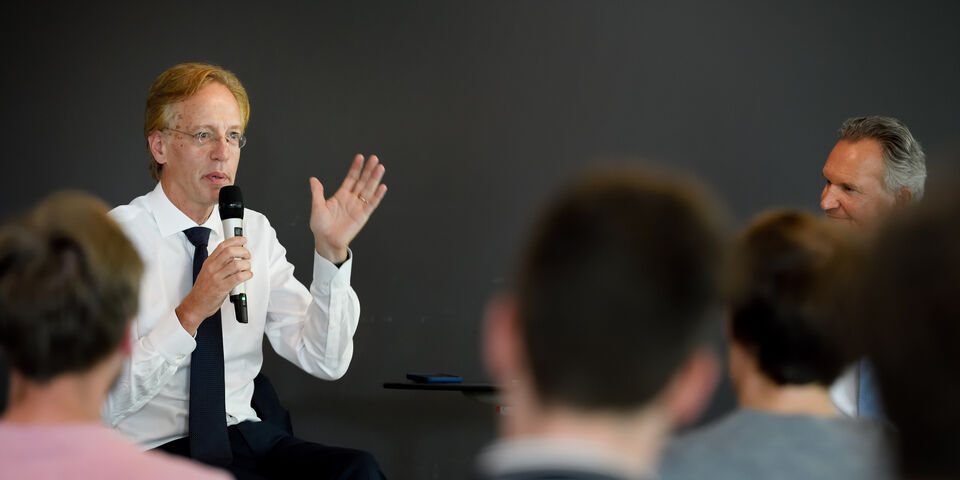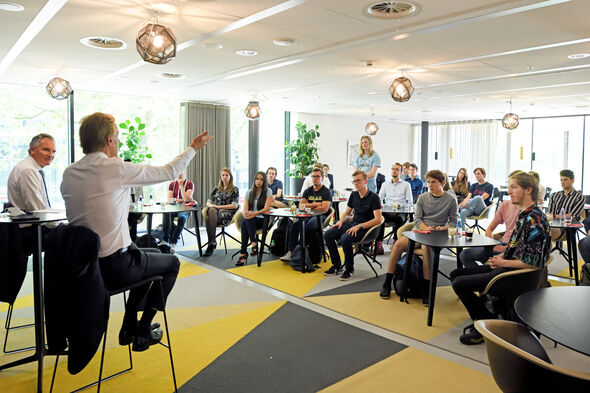Philosophizing with Robbert Dijkgraaf about the power of technology
What would you ask Robbert Dijkgraaf? Thirty students were invited Monday afternoon to a TU/e version of College Tour, with the rock-star physicist guesting and Executive Board President Robert-Jan Smits taking on the role of Twan Huys as interviewer. A conversation followed about the sharp blade of technology, and about the moral obligation of scientists to keep the general public on board with all the rapid developments.
Robbert Dijkgraaf, TU/e's guest on the occasion of the Opening of the Academic Year, himself followed a fairly unconventional path through education, he tells interviewer Robert-Jan Smits. Having lost interest midway through his degree in theoretical physics, he transferred to art school. Eventually he did complete his original degree. “I went back to it with the attitude of an artist. Like art, science is also about doing things, creating things that don't yet exist. That's how I rediscovered my drive.”
Dijkgraaf strongly urged his audience of students, each of them put forward by their degree program as 'young talent', to do whatever gives them energy. “How far you get is related to how strongly whatever you are doing resonates with who you are.”
Einstein
“‘Imagination is more important than knowledge,’ said Einstein,” quoted a member of the student audience. He is curious about the idea, or the dot on the horizon that motivates Dijkgraaf in his work. “That has to be our human ability to explain fully how the world works.” And this dot is approaching faster than we think, says the physicist. A surprisingly short time ago we didn't know the answers to questions that children ask, like, ‘why is the sky blue?’ and ‘why are leaves green?’ ‘How does the sun work?’ “As Einstein said – after all, Einstein has a quote for everything – ‘The most incomprehensible thing about the universe is that it is comprehensible.’”
Read on below the photo
It is important that science keeps the general public on board as new discoveries and inventions occur. “The very speed and success with which science is developing is what gives it its power to be very damaging. Technology is a razor-sharp blade we hold in our hands. None of you should be naive about this.” A blade, moreover, that we cannot discard because society needs technology.
As well as needing technology, society also needs the other sciences, Dijkgraaf emphasized. “Paradoxically enough, the fact that technological possibilities are becoming ever more unlimited has a paralyzing effect. If you can make anything, whatever will you make first?”
“If technology can take us from A to any B, then we need the social sciences, the humanities, art and religion to help us establish where B is.”
Fake science
Not only is science developing ever more quickly, its impact on our daily lives is becoming increasingly direct, Dijkgraaf continues. And this creates controversy. Just think of themes like smoking, CO2 reduction and, of course, corona. Data science student Isabel van den Heuvel (22) picks up on this. As well as ‘fake news’ is there also such a thing as ‘fake science’?
Certainly, and it is not even a new phenomenon, Dijkgraaf says. In the past tobacco producers made successful attempts to throw up a fake-science smokescreen to hide unpalatable conclusions about the dangers of tobacco. And today, “There is a fake institute – whose name is just one letter away from IPCC – that is spreading false climate news.”
Reason enough to keep on explaining what science is working on. “The material is complex and it has a huge impact, that's a dangerous combination. We must ensure that society embraces the solutions offered to societal issues. That is part of our scientific mission.”
Near miss
She had prepared another two questions for Robbert Dijkgraaf, Isabel van den Heuvel tells us afterwards. She was pleased with his answer to her question about fake science. “He gave a broad reaction, from a different perspective than I am used to getting from my Master's of Data Science and Engineering.”
Van den Heuvel enjoyed being part of the select audience at the University Club (“I've also seen Dijkgraaf's TV lectures.”), although she nearly missed the invitation. “The email looked like a regular TU/e newsletter and I was already moving into vacation mode. Luckily, I was sent a reminder.”



Discussion